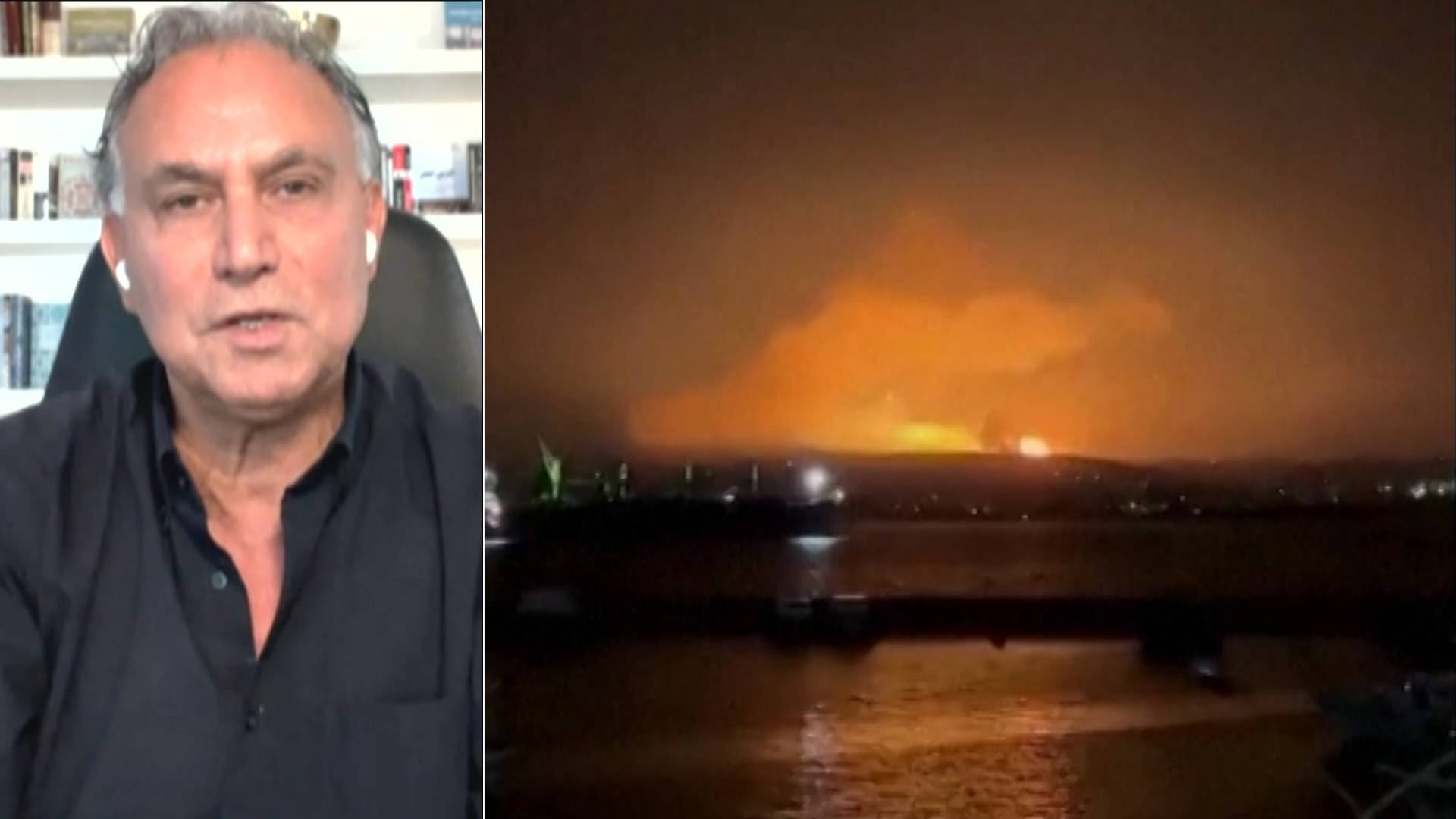This is a rush transcript. Copy may not be in its final form.
JUAN GONZÁLEZ: Israel is continuing to bomb Syria a week after Syria’s longtime ruler Bashar al-Assad was ousted from power. Last night, Israel dropped what has been described as an “earthquake bomb” on Syrian military and air defense sites in the coastal Tartus region. The Syrian Observatory for Human Rights described Israel’s bombing as the heaviest strikes in Syria’s coastal region in more than a decade. According to the group, Israeli forces have launched over 800 strikes on Syria over the past week.
The Israeli government has also approved a plan to expand illegal settlements in the occupied Golan Heights. This comes days after Israel invaded Syrian territory to seize more of the Golan Heights. In a statement, Israeli Prime Minister Benjamin Netanyahu said, quote, “Strengthening the Golan Heights is strengthening the state of Israel, and is especially important at this time. We will continue to hold on to it, make it flourish, and settle it.”
AMY GOODMAN: Meanwhile, U.S. Secretary of State Antony Blinken has confirmed the Biden administration has been in direct contact with Hayat Tahrir al-Sham, the Islamist Syrian armed group that led the surprise offensive that toppled Assad.
SECRETARY OF STATE ANTONY BLINKEN: So, first, yes, we’ve been in contact with HTS and with other parties. We have impressed upon everyone we’ve been in contact with the importance of helping find Austin Tice and bringing him home. And we’ve also shared the principles that I just laid out for our ongoing support, principles, again, that have now been adopted by countries throughout the region and well beyond. And we’ve communicated those.
REPORTER: That’s direct contact?
SECRETARY OF STATE ANTONY BLINKEN: That’s direct contact, yes.
AMY GOODMAN: Blinken made the comments in Jordan. Over the weekend, he also visited Turkey and Iraq to discuss the future of Syria.
We go now to Marwan Bishara, senior political analyst at Al Jazeera. He’s joining us from Doha.
If you can start off by responding to the latest, Marwan? Thanks for joining us again.
MARWAN BISHARA: Well, thank you for having me. I’m glad that the both of you are there in the studio. The last time I was with you, the both of you were there, and I was with Noam Chomsky, and we discussed the Arab Spring. It was the first two weeks of it.
AMY GOODMAN: Wow! Well, it’s —
MARWAN BISHARA: Thirteen years ago.
AMY GOODMAN: Yeah, that’s absolutely amazing. Oh, and a belated happy birthday to Noam Chomsky, who turned, I think it was, 96 on December 7th. Marwan, if you can talk now — I wish we could have Noam Chomsky responding, as well, but if you can talk now about the latest news? And then we’re going to go back to look at the toppling of Assad, but right now this latest news of the attacks on Syria. I think the number of Israeli strikes is at about 800 now.
MARWAN BISHARA: It’s truly incredible. Israel is setting new precedents in the Middle East. It has been doing so for the past 75, 80 years, but this week, in the way it’s acting so lawlessly against Syria, as a rogue state basically, bombing the hell out of its neighbor, simply because there has been a change of rulers in Damascus attempting a peaceful transitional governing there, taking care of the people, and sending all kinds of signals that they have absolutely zero intentions of getting into war with anyone. And yet, this what’s called “strategic opportunism” on the part of the Netanyahu government, also political opportunism just while he’s on trial for corruptions and the rest of it, being a war criminal also, he’s stealing the show by deflecting from what’s going on in Israel, attacking Syria everywhere in Syria, while at the same time expanding in the southern part of Syria beyond the already-occupied Golan Heights. And, as you said, he’s trying to double the illegal settlements in the Golan Heights. So, all in all, Israel, Netanyahu are sending exactly the wrong messages, doing exactly the wrong provocations, and at the same time setting precedents for rogueness, that I think it might not come to bite them soon, but it probably could later.
JUAN GONZÁLEZ: And your response, Marwan, to the summit that was held in Jordan over the weekend? What do you think came out of it, and especially Secretary of State Blinken being there?
MARWAN BISHARA: You know, the first impression is to remember back the leaders’ parole, parole, parole. You know, sometimes things like only words, words and more words come out of Arab leaders and Arab summits, especially those with the United States. But then, if you look a little more deep into it, you would know that a lot of those people who — a lot of those leaders who were convening the summit in Aqaba have already been normalizing relations with the former Assad regime, despite its murderous corruption, despite its narco-state criminal kleptocracy. They’ve invited him back in the Arab League in 2022 and embraced him in 2023, and they were actually strengthening economic relations in the most of them. But now they were suddenly meeting together and to talk about human rights and peaceful transition and minority rights in Syria, as if, moving forward, or as if the past 60 years, it was merely the majority rights that were violated in Syria by the Assad dictatorship.
Be that as it may, I think while they sing from the same sheet, I think they have very different, very different approaches to what security means, to what stability means in Syria, to what even terrorism means. They don’t agree on this, that and the other thing. And, in fact, each and every one of the major powers in that meeting supports different militia, different military force in Syria. Just to give you a simple example, we have now what? Five or six military forces in Syria. We have the Free Syrian Army; we have the National Syrian Army; we have the militias, Syrian forces in the south; we have the Syrian Democratic Forces; and we have, of course, HTS, Hayat Tahrir al-Sham — all in addition to Assad’s forces that remain there, as well as ISIS. A lot of these groups are supported by some of these people convening, including the Turks and the Emiratis and the Jordanians and so on and so forth. So, it’s going to be a very complicated way forward, and I remain doubtful that the Arab regimes are serious about assisting the Syrian people, moving forward.
JUAN GONZÁLEZ: I want to turn to President Biden speaking last week after the fall of Assad.
PRESIDENT JOE BIDEN: So we carried out a comprehensive sanction program against him and all those responsible for atrocities against the Syrian people. Second, we maintained our military presence in Syria, our counter-ISIS — to counter the support of local partners, as well, on the ground, their partners, never ceding an inch of territory, taking out leaders of ISIS, ensuring that ISIS can never establish a safe haven there again. Third, we’ve supported Israel’s freedom of action against Iranian networks in Syria and against actors aligned with Iran who transported lethal aid to Lebanon.
JUAN GONZÁLEZ: That was President Biden taking credit for the fall of Assad. Your response, Marwan?
MARWAN BISHARA: I tell you, it’s mind-boggling, mind-boggling, trying to whitewash genocide by saying, “Well, after all, 15 months of genocide, maybe, you know, we were on the right track after all. Look at us. You know, we are so great,” you know, and basically tapping himself on the shoulders after all the war crimes that were committed in Lebanon and in Palestine. And now he’s taking credit for some change that happened in Syria by the Syrian people — by the Syrian people — despite the complicity and the conspiracies against the Syrian people, and despite the embrace of the Assad regime by Biden’s allies in the region.
The second thing that came to mind is that, you know, Blinken and Biden keep warning us about ISIS, without mentioning that ISIS is basically the creation of the American invasion and occupation in Iraq, of the stupidities committed by everywhere from Bush to Obama, how they dealt with the question of Iraq, including the de-Ba’athifications, including the dissolving of the Iraqi military, that basically led directly to rise of ISIS. So, really, American intervention in the region, whether it is in Iraq or in Syria, and certainly in Palestine, has been catastrophic. Trying to claim credit for what happened in Syria or could happen in Syria is just beyond the pale.
AMY GOODMAN: I wanted to turn to the spokesperson Matt Miller, who was questioned by journalists recently.
MATTHEW MILLER: So, we support the work of the ICC. I know that, obviously, we have disagreed with their —
MATT LEE: Wait a second.
MATTHEW MILLER: Hold on. Hold on. I’m going to — let me address it.
MATT LEE: No, you support the work of the ICC —
MATTHEW MILLER: We do support —
MATT LEE: — until they do something like with Israel.
MATTHEW MILLER: We — so, we have had a lot — let me just answer the question.
MATT LEE: And then you don’t like them at all, or the U.S.
MATTHEW MILLER: You know what, Matt? Let me — Matt, let me answer the question, because I was addressing that before you interrupted me. We obviously have had a jurisdictional dispute with them as it relates to cases against Israel. That is a long-standing jurisdictional dispute. But that said, we have also made clear that we support broadly their work, and we have supported their work in other cases, despite our jurisdictional dispute when it comes to Israel.
AMY GOODMAN: So, that’s State Department spokesperson Matt Miller being questioned by AP’s Matt Lee, talking about why he would support Assad being brought up on war crimes charges at the International Criminal Court but doesn’t feel the same way about Netanyahu and Gallant. In fact, that was just a few days after Gallant had been in Washington, D.C., even though the ICC has issued this arrest warrant, meeting with U.S. officials. Marwan Bishara?
MARWAN BISHARA: You know, Amy, it’s funny, right? I mean, each and every era has an image that speaks to it, that represents it, that reflects it. This was one of them, laughing out, laughing at the State Department spokesperson, the Biden administration’s spokesperson, for again underlining, emphasizing and basically speaking clearly to his double standard and hypocrisy.
But, you know, as an international relations observer, let me tell you, America does not have double standard in the Middle East. It has a single standard. And that’s American interest, American-Israeli interest. So, it’s not really a double standard. I mean, you know, global powers, empires, and notably the United States, it looks like, for us intellectuals and others, moralists, that there is double standard, but in the end of the day, they have a single, narrow American strategic, Israeli strategic interest, and they’ve always spoken to it, defended it, justified it.
So, that’s why for 15 months we’ve seen — at Al Jazeera, we’ve reported from — live from Gaza the unraveling genocide, the war on doctors, the war on journalists, the war on children, on schools and hospitals. And a lot of this has trickled down to the American media, and we’ve seen it. And I think the Biden administration understands that there is a genocide, trying to get off technicality. Of course, again, this was exposed to be the total hypocrisy which it is. It’s OK for Putin to be taken or indicted by the ICC, and Assad, it’s OK, even the Myanmar generals, it’s OK, but not the Israeli leaders. It’s hypocrisy and double standard for the rest of us. For America, it’s the one single standard: American-Israeli interest.
JUAN GONZÁLEZ: I also wanted to ask you about Gaza, which the rest of the world keeps trying to forget, the atrocity still going on there. At least three journalists killed in Israeli attacks this weekend, including Al Jazeera cameraman Ahmed Al-Louh, as well as Mohammed Balousha, who last November was first reported to — about the intensive care babies who died after Israeli soldiers forcibly evacuated of the Al-Nasr Hospital. Your response to these latest attacks on your fellow journalists?
MARWAN BISHARA: You know, we’ve been covering this for a while. And at one point, you start asking yourself the question: Is this intentional? Or is it actually, you know, war, as it were, you know, just it happens? But then, when we started investigating and others started investigating and when the U.N. started looking at it, as we did when our own journalists were killed in the West Bank, clearly there is an intentional policy of assassinating journalists in Gaza. They are the eyewitnesses of the unraveling genocide, and hence getting rid of them is a thing that Israel has been doing now for 15, 16 months.
Now, why has this become more and more believable is when, then, more and more human rights organizations start reporting about how children are being targeted, I mean, you know, shooting at children in the head and in the chest. We’ve seen that by doctors, including Western doctors, American doctors, reporting about that. Then, slowly but surely, one starts to believe that, in fact, there is a government, there is an army, that is capable of killing doctors intentionally, killing journalists intentionally, in fact, killing children intentionally. And all that happens while — I don’t want to talk about American journalists — while Israeli journalists are silent. Israeli journalists are silent as countless Palestinian journalists are killed by their military. Israeli doctors are silent as Israel assassinates countless doctors in the 15, 16 clinical or hospital facilities in Gaza, or what remains of them. So, it’s not just the incredible ugliness of it all, the rogueness of it all, the inhumanity of it all. What kills me is the silence in Israel, in the United States and elsewhere.
AMY GOODMAN: Marwan Bishara, we thank you for being with us, Al Jazeera senior political analyst, speaking to us from Doha.
Coming up, South Korea’s parliament has voted to impeach the president. Stay with us.
[break]
AMY GOODMAN: “Everybody Up” by Ka. The rapper and Brownsville firefighter Kaseem Ryan passed away in October at the age of 52.











Post comments (0)